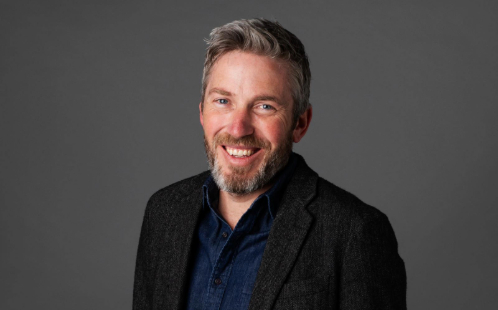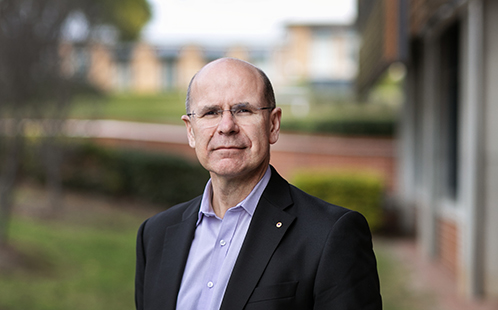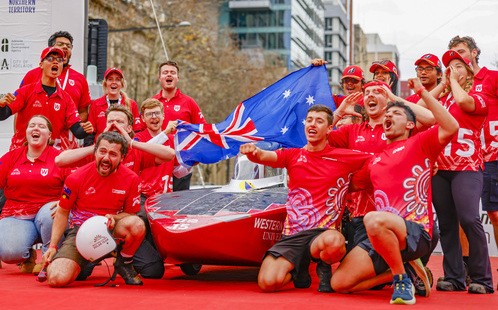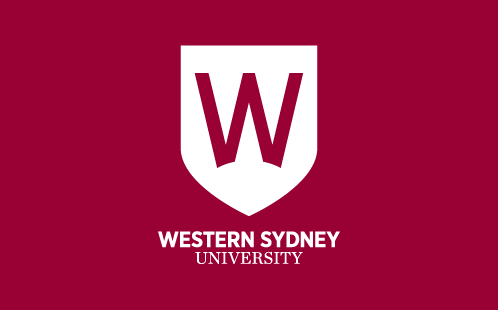Opinion: Budget about holding power, not innovation

The following opinion piece by Professor Andy Marks, Executive Director of the Centre for Western Sydney, was first published in The Daily Telegraph on Thursday, 27 March 2025.
Rarely does a federal budget evoke a vision of a day at the beach. This one does.
Imagine the scene. You’re taking a dip at Bondi.
Suddenly a rip sweeps you out to sea and you wave frantically to shore for help.
Lifesavers rush to your side, but in- stead of a rescue they say: “Looks like you’re struggling there”, high-five you, then return to base without you, promising to come back later.
It wouldn’t happen. Not least of all because our lifesavers are the world’s best and they never leave anyone stranded.
Also, because there is only one thing worse than telling someone in difficulty you’ll help them, and that’s not helping.
This is the situation we saw with a federal budget in which, Treasurer Jim Chalmers acknowledged “people are … under pressure”.
Opposition Leader Peter Dutton has said similar: “People are hurting”. They are both right.
In Western Sydney, where the average person earns $20,000 less gross income per year than workers across the rest of Sydney, that pressure and hurt is especially severe.
Western Sydney residents contend with the same spiralling inflation impact as other parts of Sydney. They are grappling with the same housing crisis – in many instances worse – than the rest of Sydney.
The promise, in the budget, of tax relief in well over a year’s time will be too late for many. We know this anecdotally, due to the increased number of students, working to support their studies, who reach out for support with food.
And in places like Bankstown, Blacktown, Campbelltown, Fairfield and Mt Druitt, where homelessness is rising, the pain is being felt now.
These areas overlay many electorates in Western Sydney that Labor and the Coalition will intensely contest over the coming weeks.
As residents from those parts enter the voting booth, many will ask themselves the question former US president Ronald Reagan made famous: “Are you better off than you were four years ago?”
The Treasurer answered that question in structural terms.
“Our economy and our Budget,” he said, “are in better shape than they were three years ago.”
Again, he’s correct. Inflation and interest rates are easing, debt is down and unemployment low.
Mr Dutton is posing Reagan’s question with understandably different intent. “I can’t find an Australian that’s had a reduction in their electricity bills,” he said.
He’s not wrong, but he hasn’t spelt out how he’ll turn that around, in the short-term, if he is elected.
When you’re drowning, you grab at whatever chance you have of rescue. A budget low on urgency and an Op- position scant on detail don’t provide Australians the help they need, not next year, but right now.
The staged tax cuts enshrined by the Coalition under Scott Morrison, then retained and modified under Prime Minister Anthony Albanese do not meet the Reagan test.
In aggregate, the tax cuts – all three stages – favoured high-income earners.
The promised additional cuts, slated for July 2026, should partially redress that imbalance but by no means soon enough, nor to the required extent.
The promise of income tax relief appears ahead of Australian elections like seagulls around a plate of hot chips at the beach.
Amid the noise and chaos of a campaign it’s hard to tell how they will in- fluence voter decision-making. Other budget measures and election pledges get clearer air.
The Treasurer’s commitment of $54 million towards prefabricated and modular housing is an exceptionally logical measure.
It is one of those investments that can be ramped up fast to support mul- tiple virtuous outcomes, like speeding up housing supply, improving energy efficiency, bolstering manufacturing and creating jobs.
The Coalition is yet to propose a comparable measure, beyond the nuclear transition, which promises benefits in manufacturing, technology and jobs, barring housing relief, but is dec- ades away and prohibitively expens- ive for taxpayers.
The frustration of Labor’s pre-fab housing pledge is that the investment is too low to have the desired impact.
The government is prepared to part with $2.4 billion to prop up Whyalla steelworks, while dedicating comparatively little to an exceptionally well considered initiative promising much wider benefit where it is most needed.
That’s the problem with budget near elections. Preservation outweighs vision.
In the absence of immediate rescue from Labor or the Coalition, the only option might be stop swimming, float, and hope the current returns you safely to shore.
ENDS
4 April 2025
Latest News

ABC RN transcript: Vice-Chancellor Professor George Williams discusses higher education sector, student support, and the impact of AI
The following is a transcript of an interview that aired on ABC Radio National Saturday Extra between presenter, Nick Bryant and Vice-Chancellor, Distinguished Professor George Williams AO.

Western Sydney University are the number one Australian solar car team at the 2025 Bridgestone World Solar Challenge
Western Sydney Solar Car team has crossed the finish line placing preliminarily sixth in the world overall, and the number one Australian team in the world’s most prestigious solar car challenge.

Western Sydney University Statement on Cyber Incidents
Western Sydney University has issued an update to its community following confirmation that previously stolen personal information was published online, including on the dark web.
Mobile options:

